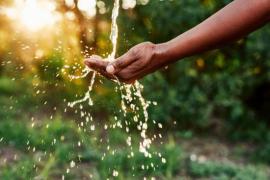
The Department of Water and Sanitation, the Gauteng Provincial Government, the City of Tshwane and Magalies Water are continuing to work together to address the water situation in Hammanskraal.
The department said this in a joint statement to update the public on progress to date to deliver water to the residents of Hammanskraal.
“The progress being made is a testament to the importance of effective cooperation between various spheres of government, working together to resolve service delivery challenges,” the department said.
In October 2024, Magalies Water, in collaboration with the City of Tshwane, successfully completed the first phase of the water treatment project, which comprises an advanced facility equipped with four package plants. This was a directive by the Minister of Water and Sanitation to ensure the supply of clean water to the Hammanskraal community.
“Thus far, significant efforts have been made in consistent pursuit to deliver potable water, including the flushing of the reticulation system, optimisation of the entire system and monitoring of the water quality. The main aim is to ensure that the water is compliant with the SANS [South African National Standards] 241 specifications,” the department said.
Phase one
The first phase of the project has been completed, meaning that at least 12.5 megalitres per day (ML/d) of treated water will be supplied to various regions in Hammanskraal.
These regions are situated within wards 49, 73, 74, and 75, specifically Mandela Village, Marokolong, Ramotse, Kekana Gardens (also referred to as Steve Bikoville) respectively, along with Babelegi Industrial.
“It is essential that we carefully explore balancing the need for uninterrupted water supply and system optimisation with the quest to fully restore the system and its integrity,” the department said.
Teams from Magalies Water and the City of Tshwane recently pursued the inspection and purging of the reticulation system, which was previously supplied by the Temba Water Works, using water sourced from the new Klipdrift Package Plant, with the aim of ensuring that the system is fully rehabilitated and disinfected.
This was followed by frequent monitoring of water quality in the reticulation network and the results show that there is significant improvement in the water quality.
In recognition of the diligent and thorough efforts made by all parties involved, the department said residents need to be aware of the significant progress that has been achieved since last week, following the initial release of water from the Klipdrift Package Plant.
The following milestones have been reached:
• The Klipdrift Package Plant continues to supply the City of Tshwane with projected volumes of approximately 12.5 ML/day.
• The water provided by the Klipdrift Package Plant meets the minimum standard requirements for drinking water in South Africa, as specified in SANS 241: 2015, as verified by a laboratory accredited by ISO/IEC 17025.
• The Babelegi Reservoir, which services the areas mentioned above, has consistently received and distributed water that complies with SANS 241:2015 at all relevant times.
From 23 December 2024 to date, the water in all the affected areas has been in full compliance with four critical indices outlined in SANS 241:2015, i.e. Acute Health I & II, Chronic Health, and Aesthetic. Currently, a limited number of areas are receiving focused attention due to operational challenges associated with turbidity (a measure of how cloudy or hazy a fluid is due to the presence of particles that are usually too small to see with the naked eye).
Based on the turbidity challenges, the department said Magalies Water and the City of Tshwane will continue to flush the system and monitor the water quality to clear the turbidity in the reticulation network.
This is aimed at ensuring that the water quality is compliant with SANS 241 specifications.
The department said a formal notification will be issued by the City of Tshwane in the near future after operational compliance targets have been achieved.
“Once the water supplied has been eliminated of turbidity, the City of Tshwane will issue a formal notification to the community that the water is safe for human consumption,” the department said.
The department further reminded all residents that South Africa is a water-scarce country.
“Let us use this precious resource sparingly and effectively implement water conservation initiatives. Each drop counts,” the department said. – SAnews.gov.za


